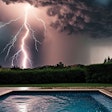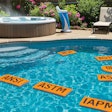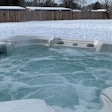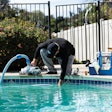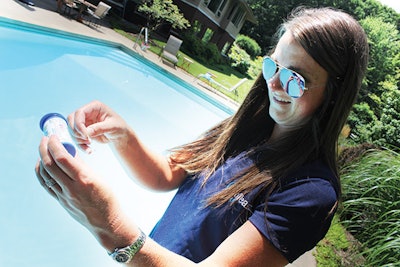
Keeping pool water pH from fluctuating (buffering) is a vital task — it ensures the water in the pool remains comfortable for bathers and doesn't attack the vessel that contains it. Carbonates have been used for this purpose in the pool industry for a many years.
Borates, less common than carbonates, perform a similar buffering function — but according to some service pros, they seem to have a special affinity for saltwater pools. That is, they add an anti-corrosion effect that can help with the problems such as rusted accessories and fixtures commonly seen in pools chlorinated with an SCG.
RELATED: Should Borates Be the First Chemical Added to the Pool?
Jonathan Durant, retail manager for Performance Pools, a builder with five locations in Minnesota, is among those who have seen the advantage in greater service life of pool equipment using borates. "The borate product provides a corrosion and scale inhibitor that is gentler on pool equipment, especially in the case of salt chlorine generators where scale and corrosion can be a problem," he says. "We recommend this product for clients with salt chlorine generators because the electrolysis that occurs in those systems causes the pH in the water to increase."
Jonathan Schulhoff, retail manager at Arthur Edwards Pools in Long Island, N.Y., has a similar take: "The salt cells last much longer in pools in which the borate level is maintained at 60 ppm. The customer's equipment lasts longer, the rails and ladders last longer, everything lasts longer. I can't quite explain it but those customers that use borates are never in my store with rusted out ladders. Even the vinyl liners seem to last longer.
"This is especially important with salt chlorine generators, now that they are becoming the norm," he adds. "The salt-conversion cells on generators in which borates are used easily last a decade. This is unheard of for most of the industry. Even customers that actually keep their pool water balanced, they only get five to six years out of an equivalent cell."
Trey Theobold, retail manager for Riverbend Sandler Pool Supply in Plano, Texas, echoes these comments. "Borates also offer the added benefit of being a terrific buffer for pH, to keep pH in balance to keep calcium scale in check. This is particularly important with those customers that have salt chlorine generated as those pool have a higher calcium level."
RELATED: How Salt Chlorine Generators Work
STARVING ALGAE
Beyond the mission of keeping pH in its target range and therefore preventing scale and corrosion, borate products are used as algaestats (meaning they prevent algae, as opposed to killing it like an algaecide). They stop algae by limiting the supply of its chief nutrient, carbon dioxide.
That ability, says John Bokor, regional sales manager for Haviland Enterprises, is why the product was first introduced and remains one of the main reasons it's become popular over the past 20-plus years. "Originally the main reason the Girvan Company brought the product to market was its algaestatic properties," he recalls.
In the simplest terms, once you put it in the water it reacts with carbon dioxide. In more technical terms, it shifts the carbonic equilibrium to the right, meaning there's less CO2 available for algae. It's decreasing the solubility of CO2 in the water. It doesn't kill algae, per se, but it starves it so you don't get algae blooms. The algae spores cannot reproduce because they lack the nutrients required for the photosynthesis process.
"By doing that," he adds, "your sanitizer consumption can be greatly reduced. You don't have to use as much because the algae isn't there. That means your sanitizer is more available to kill bacteria and oxidize organics. Using less sanitizer means you're reducing halogen byproducts. Again, it all works to increase water quality and ease maintenance."
The upshot, Durant says, is overall greater chemical efficiency. "It inhibits algae and water mold growth so that the consumer actually uses less sanitizer in the pool."
EASE OF USE
Borate additives are atypical of many pool chemicals in that they are not consumed over time. Once dissolved in water, the only way they exit the pool is by way of splash out and backwashing.
"It's a one-time application or a once a year application," Bokor says. "You put it in and it's there. There are simple test strips you can use to make sure you do have a recommended residual, 30 to 50 ppm. It's also not susceptible to UV and it's compatible with all types of sanitizers. You can use it in any pool or spa whether it's sanitized with a saltwater chlorine generation, chlorine tablets or feeders."
These factors taken together — the beneficial chemistry and convenient use — make borate a useful item in Arthur Edwards Pools product line, according to Schulhoff.
"From a retail standpoint, selling borates is easy and keeps our clients happy," he says. "Our service guys clean the pool and service the equipment but we bring back water samples to our in-house lab, which we find to be a better, controlled environment for water testing. Once we receive the water results, we call the customer and make our recommendations. If the homeowner agrees to the borate, we deliver them to the customer and either apply ourselves or leave instructions for them to apply."
Comments or thoughts on this article? Please e-mail [email protected].





































